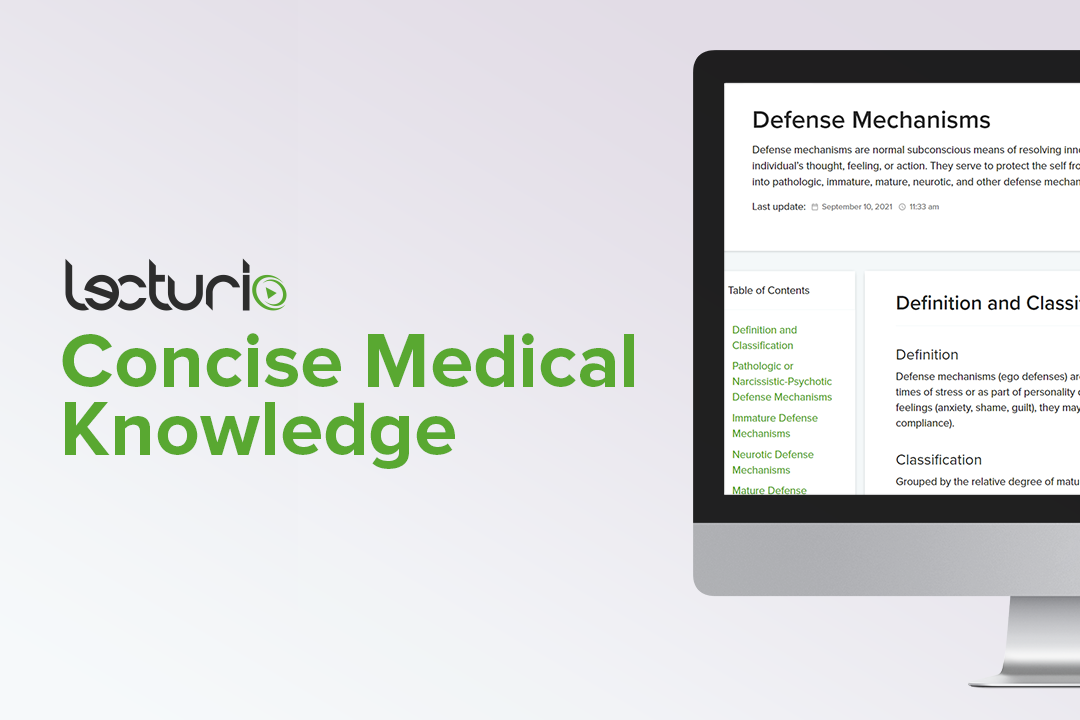Playlist
Show Playlist
Hide Playlist
Mature Defenses
-
Slides MatureDefenses Psychiatry.pdf
-
Download Lecture Overview
00:01 Now, we're going to review some of the more common mature defense mechanisms. 00:06 Let's start with a quiz. Consider this example: A 45-year-old wealthy woman anonymously donates her fortune to an area homeless shelter and then spends her time there serving foods to the patrons. 00:20 She asks for nothing in return and does her work with pride and enthusiasm. 00:25 What do you think she is displaying as her defense? Right, altruism. And how would you define altruism? Well, it's performing acts that benefit others in order to vicariously experience pleasure yourself. Let's take another example. 00:47 Here, a 35-year-old man begins an important job interview with a tasteful joke and he's got everyone laughing What do you think his defense is? That's right. It's humor. 01:00 And how would you define humor as a defense mechanism? Well, it’s expressing uncomfortable feelings through comedy without causing discomfort to oneself or others. 01:12 Here's another example: A 55-year-old man has irresistible urges to punch strangers in the face. 01:19 He decides to go and join a boxing gym and participates in competitions. 01:26 What's his defense? It's sublimation, and we define sublimation as satisfying one's wishes or impulses in an acceptable manner. 01:35 Thus channeling them rather than preventing them. Consider this one, a medical student broke up with his girlfriend the night before a major exam. He doesn't cry or show any emotion until after he studies after for and takes his exam. 01:54 What defense mechanism did he employ to help him deal with his emotions while studying? What would you choose from this list? It's suppression. 02:04 And we define suppression as purposefully ignoring an unacceptable impulse or emotion in order to diminish discomfort and accomplish a task. 02:16 That summarizes some of the more common mature defenses. 02:22 Now we all use defense mechanisms in everyday. 02:26 It's very important in psychiatry to identify which ones are useful to us and which ones cause harm and perpetuate pathology. 02:35 Mature defense mechanisms are actually quite useful because they help us get by in day to day life. And actually help to prevent discomfort and anxiety. 02:45 That summarizes the mature defenses.
About the Lecture
The lecture Mature Defenses by Helen Farrell, MD is from the course Personality Disorders.
Included Quiz Questions
Regarding mature defense mechanisms, which of the following statements would be an example of altruism?
- A 55-year-old millionaire donating anonymously to an orphanage
- A 20-year-old soccer player choosing not to worry about the big game until it is time to play
- A 25-year-old nervous medical student jokes about the boards
- A 16-year-old’s aggression towards his father is redirected to perform well in academics
- A 21-year-old with libidinous thoughts taking oaths to become a monk
Which of the following statements best defines the mechanism of sublimation?
- Satisfying ones wishes or impulses in an acceptable manner
- Involuntarily withholding an idea or feeling from conscious awareness
- Appreciating the amusing nature of an anxiety-provoking situation
- Alleviating negative feelings via unsolicited generosity
- Intentionally withholding an idea or feeling from conscious awareness
Purposely ignoring an unacceptable impulse or emotion in order to diminish discomfort and accomplish a task is the definition of which of the following defense mechanisms?
- Suppression
- Sublimation
- Altruism
- Humor
- Repression
Customer reviews
5,0 of 5 stars
| 5 Stars |
|
5 |
| 4 Stars |
|
0 |
| 3 Stars |
|
0 |
| 2 Stars |
|
0 |
| 1 Star |
|
0 |




